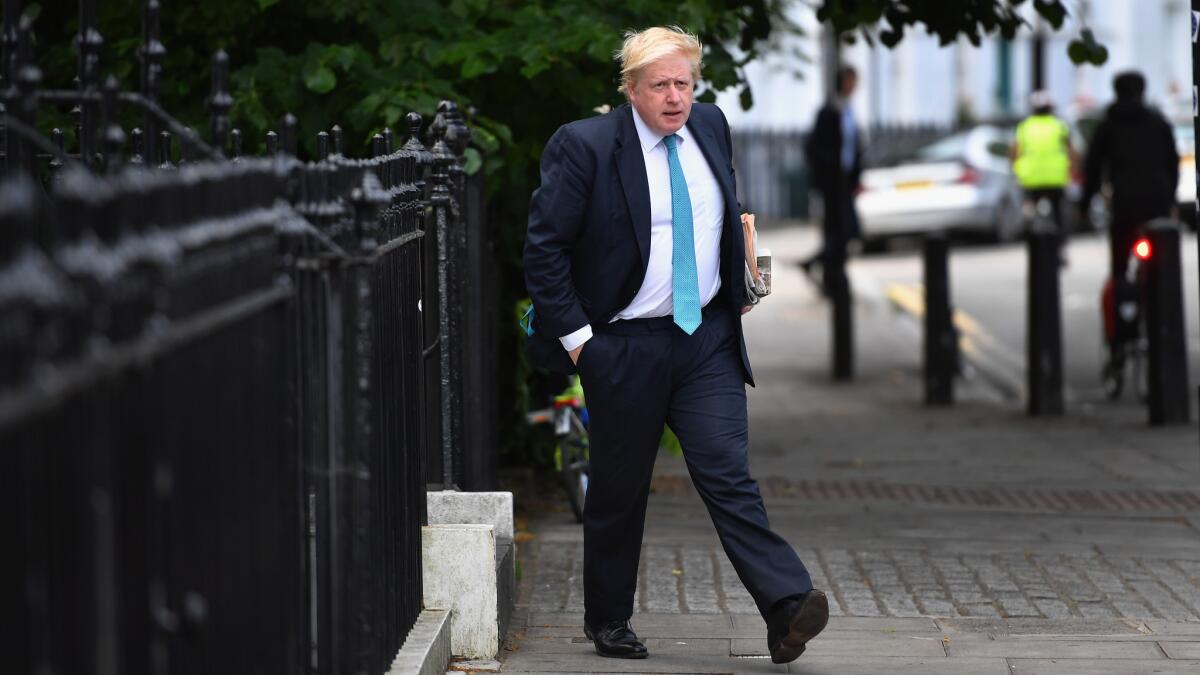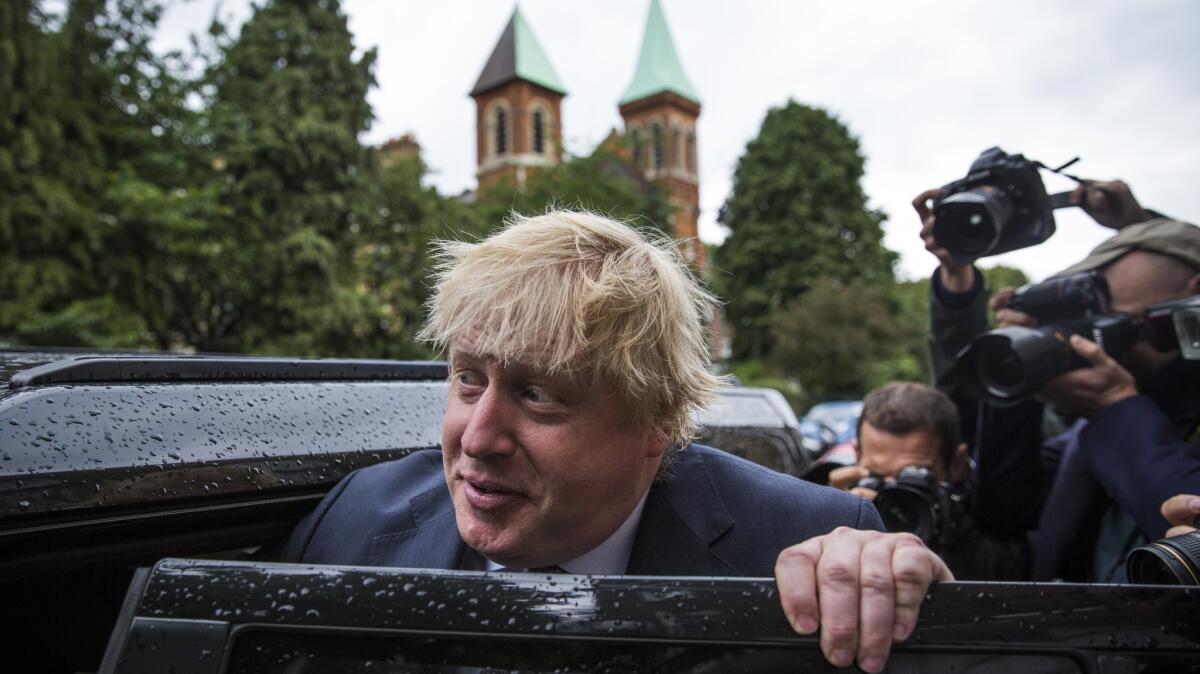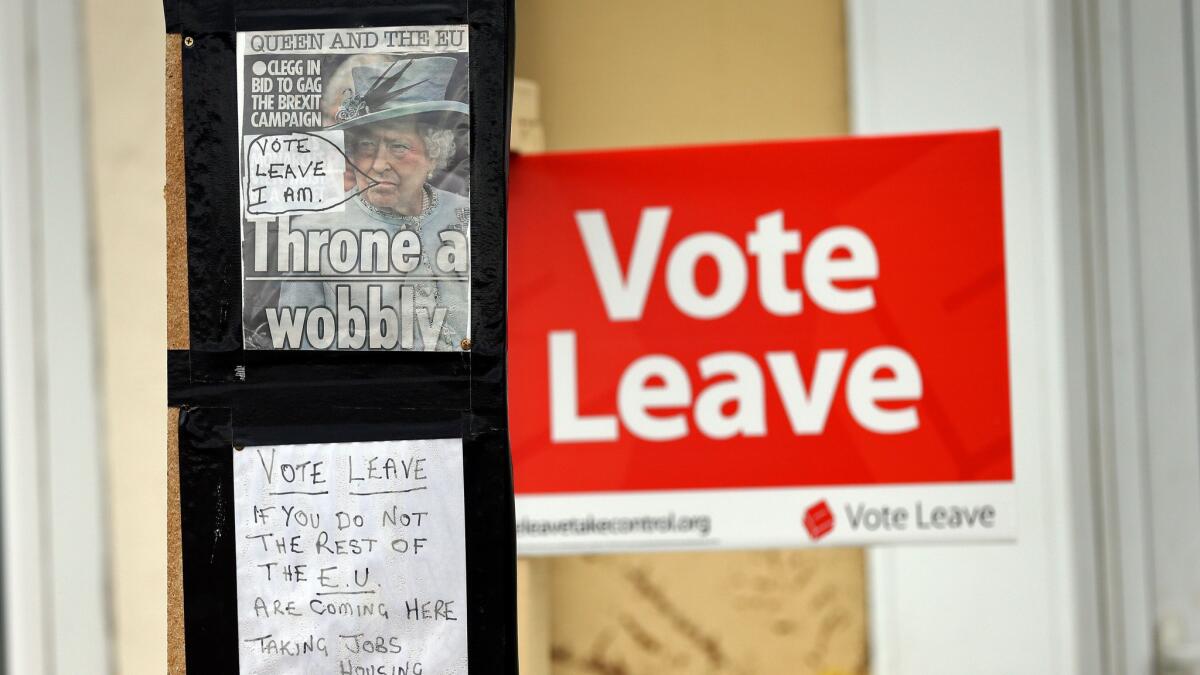Meet Boris Johnson, the man who could be Britain’s next prime minister

- Share via
Reporting from London — In Britain he is simply known as “Boris,” an eccentric and gaffe-prone politician who spent eight years as London’s mayor.
But Boris Johnson’s success spearheading the Brexit campaign has profoundly altered his career trajectory, suddenly casting him as a front-runner to succeed David Cameron as prime minister.
It would be a meteoric rise for a politician who took a calculated risk by joining the Leave campaign. And it could yet lead to his undoing.
Full coverage: Britain votes to leave the European Union »
“He somehow managed to be on the right side of chaos. The challenge now is whether he has the strength to unite the fractured Conservative Party and country,” said Matthew Flinders, politics professor at the University of Sheffield.
“You have to be a team player, understand the need to build alliances, compromise. The art of politics at the very highest level is a very difficult art to pull off. Camp Boris is about Boris and I’m not sure yet if he’s got the skills.”
Along with his political appeal and ability to deliver rousing speeches, Johnson has long radiated a certain buffoonery. He famously got stranded on a zip wire over London’s Victoria Park during the city’s Olympics while mayor and is relentlessly disheveled. He uses words like “jolly” and “chap” and bikes around the capital with his blonde locks flopping in his face.

Yet behind his bumbling persona, Johnson is a deeply driven, ambitious and shrewd man who many believe has long aspired to be the country’s leader.
“His whole life has been designed, created, positioned for that post,” said Sonia Purnell, author of the biography “Just Boris: A Tale of Blond Ambition.” “He was never going to be satisfied with being an ordinary politician.”
When Johnson announced he was joining the Leave campaign, commentators and colleagues alike felt it was a decision based more on political ambition than genuine belief. Prior to the referendum, Johnson was never known as a die-hard Eurosceptic. “I’ve never been an Outer,” he said.
Before becoming a member of parliament, Johnson was a journalist and spent time as the Telegraph newspaper’s Brussels correspondent. Purnell who worked in the Brussels bureau with Johnson, said while he had reservations about the EU, he would get angry in private when anyone disparaged the institution.
“Over the years he’s been massively in favor of the EU except for when it’s been in his advantage not to be,” Purnell said.
And when the referendum movement built steam, he announced his allegiance to Brexit, leaving the prime minister – who had sought his support – twisting in the wind. He told friends the decision had been difficult and had left him “veering all over the place like a shopping trolley.”

But Johnson has long been a bundle of contradictions and once his decision was made, the gloves came off. He launched a no-holds-barred campaign for Britain to “take back control.” It was a major scoop for the Leave campaign .
In the final live television debate before Britain headed to the polls, he delivered a rousing closing statement that drew a standing ovation fro the audience at Wembley Arena.
NEWSLETTER: Get the day’s top headlines from Times Editor Davan Maharaj >>
“There is a very clear choice between those on the Remain side who speak of nothing but fear – and those of us who offer hope,” he said. “They say we can’t do it, we say we can. They say we have no choice but to bow down to Brussels. We say they are woefully underestimating this country.
“If we vote Leave, we can take back control of our borders, of huge sums of money, of our trade policy and of our whole law-making system.”
The day after the vote, as world markets plummeted and the nation convulsed with shock, Cameron’s resignation instantly kicked Johnson into the spotlight.
He likely hadn’t expected so much attention so soon. “My chances of being prime minister are about as good as the chances of finding Elvis on Mars, or my being reincarnated as an olive,” he once said.
The highest office the 52-year-old, Eton-educated journalist-turned-politician had held was as London’s Mayor, where some accused him of surrounding himself with an intelligent, efficient team that did the bulk of the hard work, leaving him to take the credit and pose for the photos
Sadakat Kadri, a lawyer and author who knows Johnson’s family, believes he is skilled at saying what needs to be said to meet his personal objectives.
“I don’t for a moment think that Boris himself is a bigot,” Kadri said. “The problem is the reckless and miscalculated opportunism he has displayed. As far as I am concerned, any promise or statement he might now make is fundamentally incredible.”
After June 23 vote, Johnson appears to quickly backpedal on his hard line anti-EU stance, perhaps in an effort to unite the country and galvanize support.
In a column in the Telegraph newspaper Sunday, he was less than celebratory.
“I cannot stress too much that Britain is part of Europe, and always will be,” he wrote.
But it might not be enough to placate those who hold Johnson responsible for Brexit.
The day after the referendum, he was loudly booed and heckled as he exited his London home, a city that voted overwhelmingly to remain in the EU.
“The problem is that although everybody knew he was ambitious and strategic, people never thought that Boris the clown would be able to handle it at the top,” Flinders said. “I think they still don’t, but the problem is that fate or fortune seem to have created a situation where he might well get a crack at it.”
ALSO
For thousands of Brits, France is home. But what happens after Brexit?
European Union leaders pledge success as a 27-nation bloc, leave Britain’s seat empty
More to Read
Sign up for Essential California
The most important California stories and recommendations in your inbox every morning.
You may occasionally receive promotional content from the Los Angeles Times.










